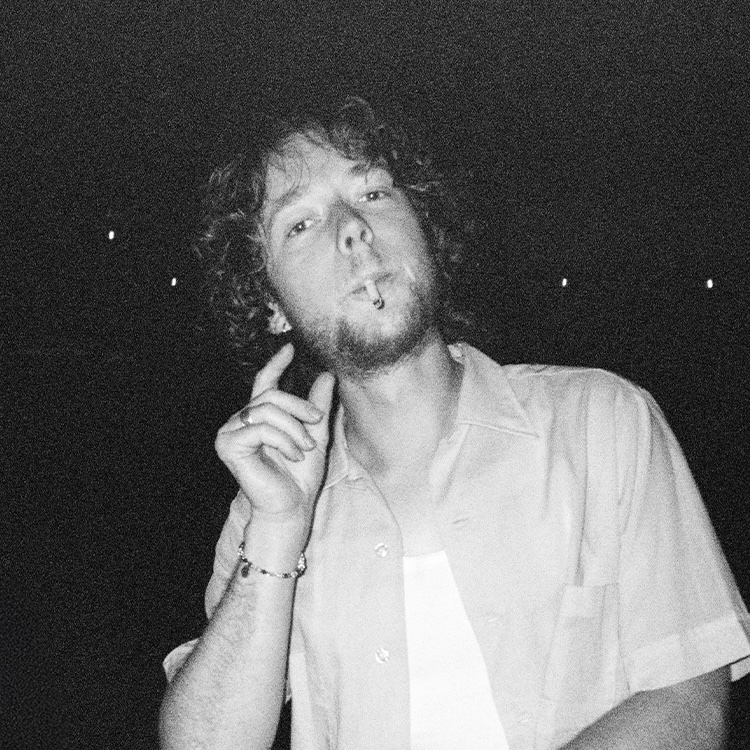
Katie Pruitt is living proof of music’s power to transform the way we experience the world. Soon
after the arrival of her acclaimed debut Expectations—a 2020 LP on which she documented her
journey in growing up queer in the Christian South—the Georgia-bred singer/songwriter/guitarist
heard from countless listeners that her songs had impacted their lives on an elemental level. With
her sophomore album Mantras, the Nashville-based musician now looks inward to explore such
matters as gender identity, self-compassion or the lack thereof, and the struggle for peace in times of
chaos and uncertainty—ultimately arriving at a body of work that speaks to the strength in undoing
harmful self-beliefs and fully living your truth.
Mainly produced by Collin Pastore and Jake Finch (known for their work with boygenius and Lucy
Dacus), Mantras delves deeper into the empathetic storytelling and incisive self-examination that
defined Expectations—an album that earned Pruitt a nomination for Emerging Artist of the Year
from the Americana Music Association and drew praise from major outlets like Rolling Stone (who
hailed Pruitt as a “dynamic new presence”) and Pitchfork (who noted that “[h]er songs are patient
but determined, navigating serious subjects with quiet familiarity”). This time around, Pruitt sets her
lived-in lyricism to a folk-leaning sound informed by her love for the more experimental edges of
indie-rock, stacking her songs with plenty of propulsive grooves and overdriven guitars as well as
working with musicians like string arranger Laura Epling (Orville Peck, Spencer Cullum).
Although several songs took shape with the help of co-writers like singer/songwriter Ruston Kelly
(Bethany Cosentino, Amanda Shires), Pruitt wrote most of Mantras on her own and imbued her
lyrics with an expansive element of autobiography. In penning the album-opening “All My Friends
(Are Finding New Beliefs),” she mined inspiration from a Christian Wiman poem of the same name,
dreaming up a fuzzed-out and summery track etched with both self-aware reflection and sharp-
witted observation on the search for clarity and purpose. Next, on “White Lies, White Jesus and
You,” Pruitt shares a hazy yet frenetic meditation on hypocrisy in religion, tapping into her intense
frustration with conservative Christian ideology. A profoundly introspective album, Mantras turns
the lens on her own inner life with songs like “Self Sabotage”—a gloriously cathartic track that
opens up about her struggle with negative thought loops. Meanwhile, on “Blood Related,” Pruitt
presents a raw but poetic rumination on how family can sometimes feel like strangers, enlisting her
mother as a background vocalist and embedding the track with audio recordings of her father and
brother from old home videos. And while Mantras often pushes into emotionally heavy terrain, its
songs frequently echo the radiant sense of joy and discovery that defined the album-making process.
On “Naive Again,” for instance, Pruitt infuses the bright and dreamy tones of glockenspiel and
xylophone into her melancholy contemplation on loss of innocence.
Looking over the tracklist to Mantras, Pruitt notes that a certain narrative thread emerged without
her intention. “I didn’t realize it at the time, but the throughline for this record ended up being my
own personal journey of letting go and learning how to love myself again—it begins with tension,
frustration, and fear and resolves to a place of acceptance, surrender, and stillness,” she says. “I hope
when people hear the record they feel what I felt after writing it, which was a sense of trusting
myself and trusting that—no matter how bad things look—there’s always hope where there’s fear. I
know that so much of the time we feel alone in our pain, so hopefully these songs help everyone to
see that they can work through those big life changes and end up loving themselves a lot more.”

Jack Van Cleaf
Jack Van Cleaf was still an independent artist when “Rattlesnake” became a viral hit in 2023, earning praise from songwriters like Noah Kahan (who hand-picked Jack as the opening act on his sold-out Stick Season Tour) and Zach Bryan (who began covering the song online). For Jack, it felt like a pivotal moment in a career that had been
building since his teenage years.
“This album is all about the vertigo of growing up,” says Jack, who makes his Dualtone Records debut with the sophomore release JVC. “It’s about re-defining and re-understanding yourself.” JVC does more than plant its flag halfway between the worlds of indie rock and Gen Z folk. It also asks big questions about home and identity.
Years after penning his first song as a high school freshman in San Diego, he headed east to Nashville, where he studied songwriting at Belmont University and released his debut album, Fruit from the Trees, after graduation. “I met many of my closest friends during my very first week at Belmont,” says Jack about his formative years in Music
City. “All talented artists in their own right, they went on to help me make my first record everything that it is, and have remained my most trusted collaborators to this day.” “Rattlesnake,” with its introspective lyrics and atmospheric acoustics, earned him a spot on Spotify’s 2024 Best New Artist list with tastemaker playlist “juniper,” but nothing – not even the praise of his heroes – could calm the existential freakout he experienced as a 20something thrust into adulthood.
“I was shell-shocked,” he remembers. “I’d spent my whole life being told what to do every single day, and I always dreamed about growing up to be my own boss. Then graduation came, and I got what I wanted… but I realized I had no idea how to function on a day-to-day basis.”
JVC was born during that period of anxiety, self-examination, and newfound freedom. It’s a sharply-written record that measures the long, winding road from past to present. Sometimes that road is literal, with songs like “Shouldn’t Have Gone to L.A.” finding Jack in transit, caught between locations without a clear anchor, his heart in search of a place to land. Elsewhere, the album traffics in metaphor, whether Jack is singing about the road to ruin in “Thinkin’ About It” (a candid look at suicidal ideation, laced with resonator and acoustic guitars) or tracing the similarities between romantic
obsession and substance abuse with the countryfied “Using You.”
“This is me grappling with adulthood, trying to figure out who I am as an adult, and how that reckons with who I was as a kid,” he says, speaking with the same heart-on-sleeve honesty that informs his writing. Once known for his confessional and cathartic folk songs, Jack digs deeper with JVC, blurring the dividing lines between acoustic Americana and electrified indie music. The result is an expansive sound that resists categorization: sparse one minute and grungy the next, dreamt up by an artist who’s never been afraid to write songs that shine a light on his own challenges.
To record JVC, Jack and producer Alberto Sewald (Katy Kirby, Sierra Hull) headed to far-flung locations like Joshua Tree and the Texas/Mexico border. Those choices were deliberate, their landscapes reflecting the barrenness evoked by many of the album’s lyrics. “I felt like I was staring into an emotional desert when I wrote these songs, experiencing this feeling of desolation around me and looking for little signs of life,” he explains. Joined by friends and musicians Austin Burns, Ethan Fortenberry, Hunt Pennington, Adam Carpenter, Nathan Cimino, and Aaron Krak, Jack recorded his
songs in a series of live takes, showcasing the artistry he’d developed as a road warrior opening for headliners like Noah Kahan, Shakey Graves, and Madi Diaz. Fellow artists like Heaven Schmitt (aka Grumpy), Charli Adams, and Annika Bennett added vocal harmonies to the songs, and Jack recorded two duets, as well. He teamed up with Gatlin for “Teenage Vampire” — a seize-the-day anthem about vices and indulgent behavior — and flew to Manhattan to record an updated version of “Rattlesnake” alongside Grammy-winning chart topper Zach Bryan.
“Zach started sharing the song on social media, then eventually sent me a DM that said, ‘If you ever want to record a version of this together, I’m in!'” Jack remembers. Zach insisted on flying in every musician who had appeared on the song’s first recording, a group composed of Jack’s best friends from college. Setting up shop at Electric Lady Studios, they recorded the heart of the new production live, leaning into instinct and inspiration as Zach and Jack traded off lines in the spur of the moment while co-producer Eddie Spear captured their camaraderie. “Zach really inspired me in
the studio,” Jack adds. “I was moved by his dedication to the moment and capturing something alive, rather than painstakingly pursuing perfection with endless takes.”
The revamped “Rattlesnake” joins a track list that includes everything from “Green” — a climate-conscious song whose pop hooks heighten the song’s activist bite — to “Piñata,” an extended metaphor dressed in hazy soundscapes and lazy, loping grooves, that was inspired by, in Van Cleaf’s words, “a moment of reckoning with a pathetic addiction to candy flavored vapes.” There’s a feeling of uplift to tracks like “Off to the Races,” “Using You,” and “Go Home, Danny” — songs that seem to split the difference between sincerity and tongue-in-cheek sarcasm — but most of JVC deals with the emotional gravity of young adulthood. Appropriately, the album closer “Life,” is filled with lurching groove and gritty guitar, nodding to grunge and ’90s alternative music while balancing the disarmingly candid nature of Jack’s lyrics.
With JVC, Jack Van Cleaf turns personal experience into something universal: a soundtrack to the years we all spend in existential free-fall, trying to find a new sense of gravity after the rules and regulations of youth have faded into the past.



